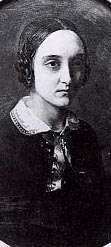 Today (December 5) is the birthday of Christina Rossetti (1830-1894). Rossetti is remembered these days for the Christmas lyric “In the Bleak Midwinter,” the long, strange, poem Goblin Market which launched a thousand knowing dissertations, and charming, harmless children’s verse like “Hurt no living thing:Ladybird, nor butterfly.”
Today (December 5) is the birthday of Christina Rossetti (1830-1894). Rossetti is remembered these days for the Christmas lyric “In the Bleak Midwinter,” the long, strange, poem Goblin Market which launched a thousand knowing dissertations, and charming, harmless children’s verse like “Hurt no living thing:Ladybird, nor butterfly.”
But Rossetti also wrote a devotional commentary on the book of Revelation. It’s the strangest commentary I’ve ever seen, running over 500 pages, and ending with the curt “If I have been overbold in attempting such a work as this I beg pardon.” But it begins with a full blast that lets you know exactly what you’re in for:
If thou canst dive, bring up pearls. If thou canst not dive, collect amber. Though I fail to identify Paradisiacal “bdellium,” I still may hope to search out beauties of the “onyx stone.”
Aaaand away she goes, for hundreds of pages of verse-by-verse commentary on Revelation, which wanders between prose and poetry, inducing (in me, at least) a dream-like state of liminality. Any time you think you’ve got Rossetti figured, she does something unexpected. You might think she’s a death-obsessed emo, but she hits you in the head with the hope of heaven. You might think she’s all about the Oxford Movement, but she gets all evangelical and premillenial on you. You might think she’s commenting on the Bible, but then she says
Earth cannot bar flame from ascending
Hell cannot bind light from descending
Death cannot finish life never endingEagle and sun gaze at each other
Eagle at sun brother at Brother
Loving in peace and joy one another
Rossetti has decided that the spiritual lesson of the book of Revelation is patience, and her long and meandering commentary requires the patience and devotion it cultivates. I’ve never finished it, though I’ve tried a few times. Or maybe I have finished, but dreamed I hadn’t.
Little Lamb, who lost thee?–
I myself, none other.
Little Lamb, who found thee?–
Jesus, Shepherd, Brother.
Ah, Lord, what I cost Thee!
Canst Thou still desire?–
Still Mine arms surround thee,
Still I lift thee higher,
Draw thee nigher.
Rossetti’s Face of the Deep also reveals a first-rate theological mind at work. Somewhere around page 239 she begins pondering the tendency of so many Christians to ignore the Holy Spirit. She seeks the reasons for this neglect, not to excuse it, but to show where she ought be especially on guard. First, says Rossetti, neither half of the Holy Spirit’s name lends itself to picking out one person of the Trinity: All three are Holy, all three are Spirit. Further, the Spirit does so well at indwelling the church that he can be overlooked:
The actual Graciousness and overflowing Goodness of God the Holy Ghost may be so misused by us as to obscure His Personality. His diffusion throughout the Communion of Saints may be misconstrued as His non-existence independent of that Communion; reducing our conception of Him to a grace, a gift; not a distinct, Divine, Almighty Person.
And though Rossetti is radically Christ-centered in her devotion, there is even a way of praising Christ which, though found in the language of the Book of Common Prayer, must be guarded lest it keep us from giving the Spirit his due:
I think too that the devout formula, “Jesus Christ our only Mediator and Advocate,” may beguile us into positive though inadvertent misstatement, unless we consciously limit “only” to “Mediator”; jealously bearing in mind that God the Holy Ghost vouchsafes to be our other Advocate.
The Face of the Deep is well worth reading around in, though I’m not convinced it can be read cover to cover. I don’t think we understand Rossetti if we don’t take it into account; and Rossetti is well worth coming to terms with.
(See her advice for Christian girls on reading Homer here)